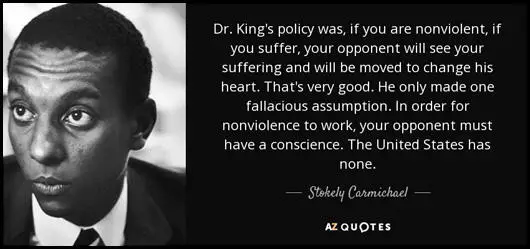On this day on 29th June
On this day in 1546 Anne Askew writes about being tortured because of her religious beliefs. "Then they did put me on the rack, because I confessed no ladies or gentlemen, to be of my opinion... the Lord Chancellor and Master Rich took pains to rack me with their own hands, till I was nearly dead. I fainted... and then they recovered me again. After that I sat two long hours arguing with the Lord Chancellor, upon the bare floor... With many flattering words, he tried to persuade me to leave my opinion... I said that I would rather die than break my faith."
Askew was removed to a private house to recover and once more offered the opportunity to recant. When she refused she was taken to Newgate Prison to await her execution. On 16th July 1546, Agnew "still horribly crippled by her tortures" was carried to execution in Smithfield in a chair as she could not walk and every movement caused her severe pain. It was reported that she was taken to the stake which had a small seat attached to it, on which she sat astride. Chains were used to bind her body firmly to the stake at the ankles, knees, waist, chest and neck. (17)
Anne Askew's executioner helped her die quickly by hanging a bag of gunpowder around her neck. Also executed at the same time was John Lascelles, John Hadlam and John Hemley. John Bale wrote that “Credibly am I informed by various Dutch merchants who were present there, that in the time of their sufferings, the sky, and abhorring so wicked an act, suddenly altered colour, and the clouds from above gave a thunder clap, not unlike the one written in Psalm 76. The elements both declared wherein the high displeasure of God for so tyrannous a murder of innocents."
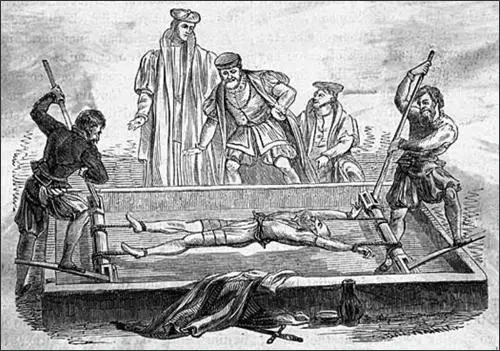
On this day in 1858 Julia Lathrop, the daughter of William Lathrop, was born in Rockford, Illinois on 29th June, 1858. Julia's father had helped establish the Republican Party and served in the state legislature (1856-57) and Congress (1877-79).
Lathrop attended Rockford Seminary where she met Jane Addams and Ellen Gates Starr. After graduating from Vassar College in 1880 she worked in her father's law office.
In 1890 Lathrop moved to Chicago where she joined Jane Addams, Ellen Gates Starr, Alzina Stevens, Edith Abbott, Grace Abbott, Florence Kelley, Mary McDowell, Alice Hamilton, Sophonisba Breckinridge and other social reformers at Hull House.
In 1893 Lathrop was appointed as the first ever woman member of the Illinois State Board of Charities. Over the next few years she helped introduce reforms such as the appointment of female doctors in state hospitals and the removal of the insane from the state workhouses.
The women at Hull House were active in the campaign to persuade Congress to pass legislation to protect children. In 1912 President William Taft appointed Lathrop as the first head of the newly created Children's Bureau. Over the next nine years Lathrop directed research into child labour, infant mortality, mother mortality, juvenile delinquency, mothers' pensions and illegitimacy.
In 1925 Lathrop was appointed to the Child Welfare Committee established by the League of Nations. Julia Lathrop died in Rockford on 15th April, 1932.
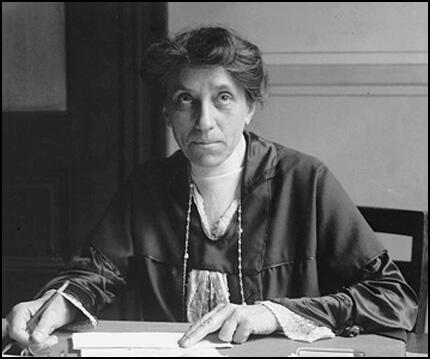
On this day in 1871 Benjamin Disraeli makes speech on the proposed Secret Ballot Act. Disraeli, the leader of the Conservative Party, made it clear that he was totally opposed to the measure. He argued that the country had experienced too much parliamentary reform over the last few years and that it had encouraged public disorder: "This arrangement about the ballot is part of the, same system, a system which would dislocate all the machinery of the state, and disturb and agitate the public mind."
Gladstone was determined not to give up and the Secret Ballot bill was reintroduced in 1872. It was passed by the House of Commons and when it was sent to the House of Lords the peers were warned that the government would call a general election if they rejected it a second time. As a result the act was passed on 18th July 1872. The first secret-ballot by-election took place as early as 15th August.
Paul Foot points out that in the 1874 General Election, none of Disraeli's terrible prophecies came true and it was a much more fairer contest: "At once, the hooliganism, drunkenness and blatant bribery which had marred all previous elections vanished. employers' and landlords' influence was still brought to bear on elections, but politely, lawfully, beneath the surface."
On this day in 1909 Frances Balfour observed the arrest of several members of the Women Social & Political Union and wrote to Millicent Fawcett about it."I am just back from a night with the militants… The police in solid lines turned the women into Victoria Street. Here we saw several arrests, the women all showing extraordinary courage in the rough rushes of the crowd round them… Two women, exactly in front of us threw stones at the windows. Poor shots; I don't think the glass was cracked. A policeman flew round at them and had his arms round their necks before we could wink. The courage that dares this handling I do admire. There is a fine spirit, but whether it is not rather thrown away on these tactics remains a doubt in my mind."
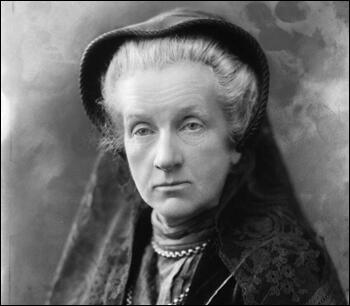
On this day in 1932 John Dos Passos publishes article in The New Republic on the Bonus Army. "A bunch of out-of-work ex-service men in Portland, Oregon, figured they needed their bonus now; 1945 would be too late, only buy wreaths for their tombstones. They figured out, too, that the bonus paid now would tend to liven up business, particularly the retail business in small towns; might be just enough to tide them over till things picked up. So three hundred of them started east in old cars and trucks, hitchhiking, riding on freight trains. By the time they reached Council Buffs (Iowa) they found other groups all over the country were rebelling against their veterans' organizations and getting the same idea. It was an Army. They organized it as such and nicknamed it the Bonus Expedition Force."
In May 1932, 10,000 of these ex-soldiers marched on Washington in an attempt to persuade Congress to pass the Patman Bill. When they arrived in the capital the Bonus Marchers camped at Anacostia Flats, an area that had formerly been used as an army recruiting centre. They built temporary homes on the site and threatened to stay there until they received payment of money granted to them by Congress. It was clear that the veteran camp was a source of great embarrassment to Hoover and provided further proof of the government's callous unconcern for the plight of the people."
It is estimated that by June 1932, there were 20,000 men living in the camp. President Herbert Hoover refused to meet with the leaders of the Bonus Army and ordered the gates of the White House chained shut. Police Chief Pelham Glassford did his utmost to provide tents and bedding for the veterans, furnished medicine, and assisted with food and sanitation. "The men were camped illegally, but Glasford (who had been the youngest brigadier general with the AEF in France) choose to treat them simply as old soldiers who had fallen on old times who had fallen on hard times. He resisted efforts to use force to dislodge them."
On 15th June the House of Representatives passed the Bonus Bill by 209-176. Two days later the Senate defeated it 62-18. The veterans were now ordered to leave the city. According to the authorities some 5,000 people did leave the camp. Hoover claimed that "an examination of a large number of names discloses the fact that a considerable part of those remaining are not veterans; many are communists and persons with criminal records."
The vast majority of the people in the camp refused to move. Secretary of War, Patrick J. Hurley, told Hoover that the country faced the possibility of a Communist uprising of vast proportions and talked about the need to impose martial law. The District of Columbia commissioners, on the suggestion of President Hoover, ordered Glassford to clear the area where the veterans were squatting. More controversially, he also instructed the armed forces to become involved in this action.
On 28th July, General Douglas MacArthur and assisted by Major George S. Patton, used soldiers from the 3rd Cavalry Regiment and the 16th Infantry, supported by tanks and machine guns, to clear the area. After a tear gas barrage the cavalry swept the camp, followed by infantrymen, who systematically set fire to the veterans' tents and temporary buildings to stop the men returning. MacArthur, controversially used tanks, four troops of cavalry with drawn sabers, and infantry with fixed bayonets, on the ex-serviceman. He justified his attack by claiming the "mob" was animated by the "essence of revolution".
During the operation two of the men, William Hushka and Eric Carlson, were killed. Time Magazine reported that: "When war came in 1917 William Hushka, 22-year-old Lithuanian, sold his St. Louis butcher shop, gave the proceeds to his wife, joined the Army. He was sent to Camp Funston, Kansas where he was naturalized. Honorably discharged in 1919, he drifted to Chicago, worked as a butcher, seemed unable to hold a steady job. His wife divorced him, kept his small daughter. Long jobless, in June he joined a band of veterans marching to Washington to fuse with the Bonus Expeditionary Force. 'I might as well starve there as here', he told his brother. He took part in the demonstration at the Capital the day Congress adjourned without voting immediate cashing of the bonus. Last week William Hushka's Bonus for $528 suddenly became payable in full when a police bullet drilled him dead in the worst public disorder the capital has known in years."
President Herbert Hoover released a statement explaining his actions: "For some days police authorities and Treasury officials have been endeavoring to persuade the so-called bonus marchers to evacuate certain buildings which they were occupying without permission... This morning the occupants of these buildings were notified to evacuate and at the request of the police did evacuate the buildings concerned. Thereafter, however, several thousand men from different camps marched in and attacked the police with brickbats and otherwise injured several policemen, one probably fatally... An examination of a large number of names discloses the fact that a considerable part of those remaining are not veterans; many are communists and persons with criminal records."
Some newspapers praised President Hoover for acting decisively, however, most were highly critical of what he had done. The The New York Times, devoted its first three pages to the coverage, including a full page of photographs showing the veterans being attacked. The Washington Daily News stated: "The mightiest government in the world chasing unarmed men, women and children with Army tanks. If the Army must be called out to make war on unarmed citizens, this is no longer America.
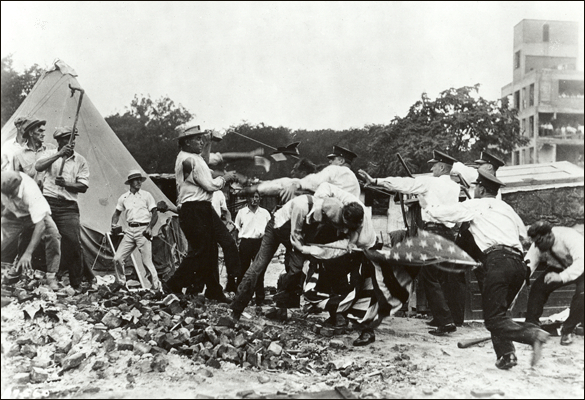
On this day in 1938 Frederick Lutz, member of the Abraham Lincoln Battalion during the Spanish Civil War, hears Langston Hughes read his poems. "Heard Langston Hughes last night; he spoke at one of our nearby units - the Autoparque, which means the place where our Brigade trucks and cars are kept and repaired. It was a most astonishing meeting; he read a number of his poems; explained what he had in mind when he wrote each particular poem and asked for criticism. I thought to myself before the thing started "Good God how will anything like poetry go off with these hard-boiled chauffeurs and mechanics, and what sort of criticism can they offer?" Well it astonished me as I said. The most remarkable speeches on the subject of poetry were made by the comrades. And some said that they had never liked poetry before and had scorned the people who read it and wrote it but they had been moved by Hughes's reading. There was talk of "Love" and "Hate" and "Tears"; everyone was deeply affected and seemed to bare his heart at the meeting, and the most reticent (not including me) spoke of their innermost feelings. I suppose it was because the life of a soldier in wartime is so unnatural and emotionally starved that they were moved the way they were."
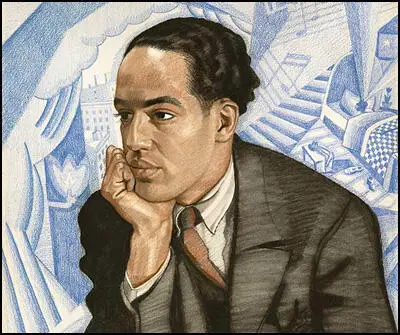
On this day in 1940 the Alien Registration Act is passed by Congress. It was now illegal for anyone in the United States to advocate, abet, or teach the desirability of overthrowing the government. The law also required all alien residents in the United States over 14 years of age to file a comprehensive statement of their personal and occupational status and a record of their political beliefs. Within four months a total of 4,741,971 aliens had been registered. The main objective of the act was to undermine the American Communist Party and other left-wing political groups in the United States. One of the first men to be arrested and imprisoned under the act was James Cannon, the national secretary of the Socialist Workers Party.
After the Second World War it was now decided to use the Alien Registration Act against the American Communist Party. On the morning of 20th July, 1948, Eugene Dennis, the general secretary of the American Communist Party, and eleven other party leaders, included William Z. Foster, Benjamin Davis, John Gates, Robert G. Thompson, Gus Hall, Benjamin Davis, Henry M. Winston, and Gil Green were arrested and charged under the Alien Registration Act. This law, passed by Congress in 1940, made it illegal for anyone in the United States "to advocate, abet, or teach the desirability of overthrowing the government".
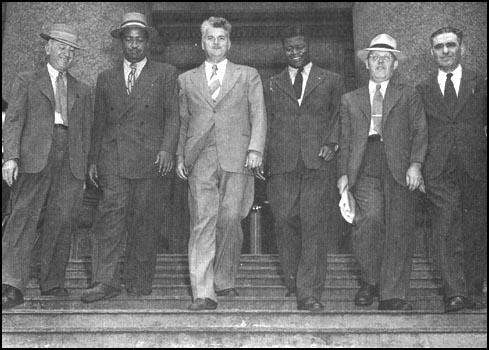
Williamson and Jacob Stachel leaving the courthouse in New York (21st July, 1948)
On this day in 1941 Stokely Carmichael was born in the Port of Spain, Trinidad. Carmichael moved to the United States in 1952 and attended high school in New York City. He entered Howard University in 1960 and soon afterwards joined the Student Nonviolent Coordinating Committee (SNCC).
In 1961 Carmichael became a member of the Freedom Riders. After training in non-violent techniques, black and white volunteers sat next to each other as they travelled through the Deep South. Local police were unwilling to protect these passengers and in several places they were beaten up by white mobs. In Jackson, Mississippi, Carmichael was arrested and jailed for 49 days in Parchman Penitentiary. Carmichael also worked on the Freedom Summer project and in 1966 became chairman of SNCC.
On 5th June, 1966, James Meredith started a solitary March Against Fear from Memphis to Jackson, to protest against racism. Soon after starting his march he was shot by sniper. When they heard the news, other civil rights campaigners, including Carmichael, Martin Luther King and Floyd McKissick, decided to continue the march in Meredith's name.
When the marchers got to Greenwood, Mississippi, Carmichael and some of the other marchers were arrested by the police. It was the 27th time that Carmichael had been arrested and on his release on 16th June, he made his famous Black Power speech. Carmichael called for "black people in this country to unite, to recognize their heritage, and to build a sense of community". He also advocated that African Americans should form and lead their own organizations and urged a complete rejection of the values of American society.
The following year Carmichael joined with Charles V. Hamilton to write the book, Black Power: The Politics of Liberation in America (1967). Some leaders of civil rights groups such as the National Association for the Advancement of Coloured People (NAACP) and Southern Christian Leadership Conference (SCLC), rejected Carmichael's ideas and accused him of black racism.
Carmichael also adopted the slogan of "Black is Beautiful" and advocated a mood of black pride and a rejection of white values of style and appearance. This included adopting Afro hairstyles and African forms of dress. Carmichael began to criticize Martin Luther King and his ideology of nonviolence. He eventually joined the Black Panther Party where he became "honorary prime minister".
When Carmichael denounced United States involvement in the Vietnam War, his passport was confiscated and held for ten months. When his passport was returned, he moved with his wife, Miriam Makeba, to Guinea, where he wrote the book, Stokely Speaks: Black Power Back to Pan-Africanism (1971).
Carmichael, who adopted the name, Kwame Ture, also helped to establish the All-African People's Revolutionary Party and worked as an aide to Guinea's prime minister, Sekou Toure. After the death of Toure in 1984 Carmichael was arrested by the new military regime and charged with trying to overthrow the government. However, he only spent three days in prison before being released.
Stokely Carmichael died of cancer on 15th November, 1998.
